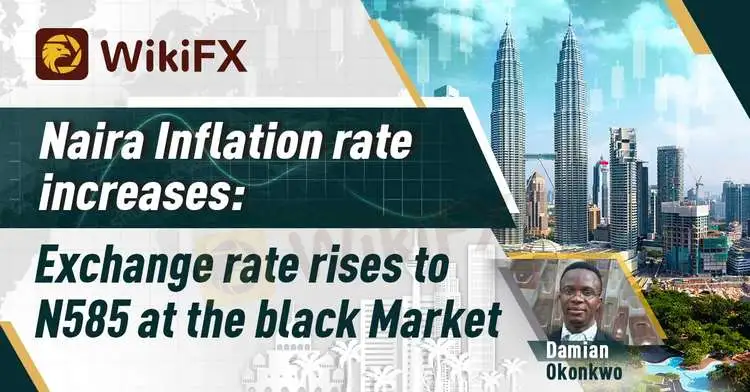简体中文
繁體中文
English
Pусский
日本語
ภาษาไทย
Tiếng Việt
Bahasa Indonesia
Español
हिन्दी
Filippiiniläinen
Français
Deutsch
Português
Türkçe
한국어
العربية
Naira Inflation rate increases: Exchange rate rises to N585 at the black Market
Abstract:The naira exchange rate has been stressed so much at the black Market again due to the wild dollar scarcity. Naira is today exchanged at N585 per $1 at the black market. This has been caused by the failure of the Nigerian commercial banks to provide enough dollars to many traders and travelers after the CBN dissolved the Bureau de Change in the country

By: Damian Okonkwo
The Nigerian exchange rate has be so much stressed at the black Market all through the month of April despite the efforts by the CBN to contain Inflation. Naira seem to have witnessed the strongest inflation so far in the first quarter this month of April. This has been caused by the shaky economy burdened by international debits and dependency on importations.
Many businesses today are crumbling in Nigeria with the dollar exchange rate at the black Market also known as the ABOKIFX skyrocketing to as high as N585 last week's Friday. The black market dealers claimed they bought dollar at N582 and now dsold for N585 on Friday evening, April 22, 2022. A repetition of incidence that occurred earlier last week during Easter seem to be gradually setting in again when dollar was sold for N600 on Easter Sunday evening.

What are the major reasons why the Naira exchange rate is increasing daily?
« The Central Bank Policy: The Naira exchange rate has increased drastically last year following the CBN new policy last year on July 27, 2021, that cut off the popular Bureau de Change from supplying dollar to traders. The CBN rather charge the Nigerian banks to provide dollars for commercial traders and travelers. Since then an artificial scarcity of dollars has been created in the exchange market as banks have not been able to supply enough dollars to Nigerians. The naira had lost value at a whooping N95 to the dollar in less than a year from N490/$1 to N585/$1 on April 22, 2022.
« High Unemployment rate: Nigeria despite being blessed with rich natural resources and able-bodied men and women, still tops the list as the country with the highest unemployment rate. The rate of poverty has so much increased today scaring investors away from the Nigerian Market.
« International Debts: It is very sad that Nigeria as a country still depends on the other Western countries including China for loans to offset her annual budgets. This has been the chief cause of Inflation on the naira as Nigeria ranks the most indebted country across the world with debts unrepaid running in billions of dollars

Disclaimer:
The views in this article only represent the author's personal views, and do not constitute investment advice on this platform. This platform does not guarantee the accuracy, completeness and timeliness of the information in the article, and will not be liable for any loss caused by the use of or reliance on the information in the article.
Read more

CySEC Revokes UFX Broker Licence as Reliantco Halts Global Operations
The Cyprus Securities and Exchange Commission (CySEC) has officially withdrawn the Cyprus Investment Firm (CIF) licence of Reliantco Investment Limited, the operator of UFX.com. This decision followed a six-month period during which the company failed to provide any investment services or perform investment activities.

Elon Musk Sparks Debate Over Presidential Power and Federal Reserve Independence
Elon Musk has voiced his support for the controversial idea that United States presidents should have a role in shaping Federal Reserve policies. This endorsement aligns with recent remarks from President-elect Donald Trump, who has hinted at revisiting the central bank's independence, a long-held tradition in the nation's financial governance.

Consob Sounds Alarm: WhatsApp & Telegram Users Vulnerable to Investment Scams
Italy's financial regulator, Consob, has raised alarms over an increase in fraudulent schemes targeting investors through mobile messaging platforms such as WhatsApp and Telegram.

Crypto 101: Coins vs Tokens
For those new to the world of cryptocurrency, terms like "coin" and "token" may seem interchangeable. However, understanding the distinction between these two digital assets is crucial for navigating the crypto landscape. Both coins and tokens serve as integral components of blockchain ecosystems, yet they differ in their functionalities, use cases, and the technologies underpinning them.
WikiFX Broker
Latest News
BSP Shuts Down Uno Forex Over Serious AML Violations
ACY Securities Expands Global Footprint with South Africa Acquisition
Tokyo Police Arrest 4 for Unregistered FX Trading Scheme
Rupee gains against Euro
WikiEXPO Global Expert Interview: The Future of Financial Regulation and Compliance
DFSA Warns of Fake Loan Approval Scam Using Its Logo
Consob Sounds Alarm: WhatsApp & Telegram Users Vulnerable to Investment Scams
CySEC Revokes UFX Broker Licence as Reliantco Halts Global Operations
Axi Bids AUD 52M to Acquire Low-Cost Broker SelfWealth, Outbidding Competitor Bell Financial
Crypto Influencer's Body Found Months After Kidnapping
Currency Calculator


